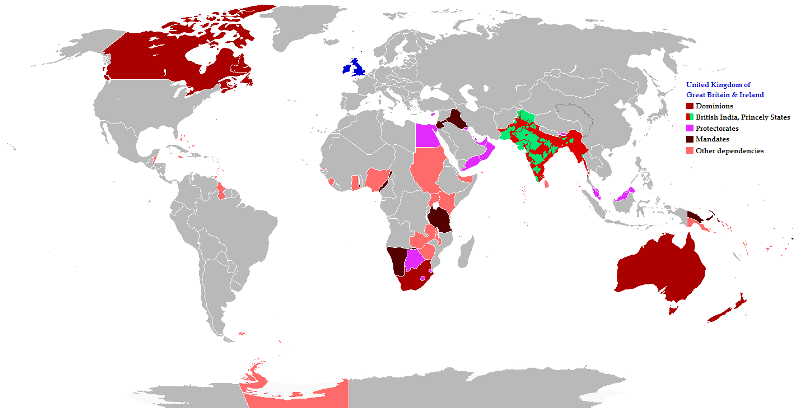UK Green Issues
http://www.greenpolicy360.net/w/Category:United_Kingdom
Green Issues
The industrial age found its beginnings in Europe and in the island nation called Britain by some, England by others, and the United Kingdom by those who tended to look upon the far-flung British colonies and 'holdings' as the mark of the British Empire. The power of the industrial age was carried far afield as the British army and navy wielded unrivaled capabilities in the acquisition of markets, trade routes and raw materials that flowed from world markets to the 'mother country.'
The Victorian era at its height reached across the planet and oceans as the British fleet with its coal-powered ships replaced the former age of discovery vessels under sail and, in turn, was replaced by oil-powered ships with rising strategic need to tap into and control discoveries of vast oil/gas reserves in the Middle East, Persia and the Caucus region that combined with coal to power the UK's imperial reach through the 1800's into the 20th century.
Resource wars escalated as national security began to be defined by access and control of fossil fuels that powered national economies. British interests led to multiple conflicts and new American interests, as the US economy fired up, would replace British, and European, and Japanese industrial powers as the ascendant economy. World War II saw the eclipse of the British Empire even as the US capabilities and military reached unparalleled power worldwide.
The Cold War pitted Soviet-bloc industrialization/militarization against the US-bloc industrialization-militarization, with non-aligned nations caught up in the cross-fire of interests. The struggle and military-related spending would lead to the eventual over-extension of the Soviets and its fall and replacement by the Russian Federation, which is currently at the beginning of the realigning in a new 'Eurasian strategy'.
The UK watches as a new geopolitics forms on the horizon. Energy agreements between Russia and China, and China and Iran, are described in the news as "energy deals of the century" and they act to ensure the conventional oil/gas supplies and fossil-fueled modern industrial age even as the impacts to global security with carbon emissions and climate change are beginning to be realized.
The UK, as the land of the industrial age's beginning, perhaps will play a special role going forward, given its knowledge-base, its scientific capabilities, and its responsibilities.
The future and a new era referred to as the anthropocene is now extending globally, developed- and developing nations alike. Our human impacts on the planet will tell the story.
Let's start with one of the more prescient Brits, the environmental writer George Monbiot, as he looks to what is befalling the UK and its former 360°, 'Sun Never Sets' empire. The UK now looks out at the larger picture, planet earth, of which the former British Empire is a small part.
- The British Empire in 1919, at its greatest extent with presence on all inhabited continents
○ ○ ○ ○ ○ ○ ○ ○ ○ ○ ○ ○ ○ ○ ○
Latest Posts by Monbiot
Sacrifice: The joints of meat that do more damage than a long-haul flight. Read more.
○ ○ ○ ○
Walk on the Wild Side: Rewilding, hillwalking and the extraordinary history of these islands. Read more.
○ ○ ○ ○
Life and Death: The remarkable decline in violence between humans suggests that we could also restrain our violence against the planet. Read more.
○ ○ ○ ○
Cop-Out: The COP21 climate talks in Paris were not the success that governments claim, but a disastrous failure. Read more.
○ ○ ○ ○
A Storm of Ignorance: Censoring official advice, stripping the hills and rivers, the government ensures that disasters like the Cumbria floods will keep recurring. Read more.
○ ○ ○ ○
Look Around: There are plenty of real problems with aircraft emissions. But thousands of people are obsessed instead with a fairy tale. Read more.
○ ○ ○ ○
Churchill Syndrome: Why is the government so quick to bomb, yet so slow to act on climate change? Read more.
○ ○ ○ ○
Putting the Con into Consultation: An online tool that changes your answers is not the only problem with this attempt to fake public consent for dredging a dolphin reserve. Read more.
○ ○ ○ ○
False Promise: The belief that economic growth can be detached from destruction appears to be based on a simple accounting mistake. Read more.
○ ○ ○ ○
Pregnant Silence: It’s about time we discussed the real population crisis. Read more.
○ ○ ○ ○
Strategic Incompetence: The agencies supposed to protect the living world have been neutered, and polluters and wildlife destroyers now have a free hand. Read more.
○ ○ ○ ○
Moral Blankness: A leaked letter from David Cameron offers a remarkable – and terrifying – insight into his mind. Read more.
○ ○ ○ ○
The Dolphin Killers of Cardigan Bay: Why does the Welsh government propose this gratuitous act of destruction? It refuses to say. Read more.
○ ○ ○ ○
Loved to Death: The UK’s national parks should be redesignated as ecological disaster zones. Read more.
○ ○ ○ ○
How to Build a Crisis: Banks and corporations are being liberated from the rule of law, and are ripping the world apart. Read more.
○ ○ ○ ○
Nothing to See Here: In the greatest environmental disaster of the 21st Century (so far), Indonesia has been blotted out by smoke. And the media. Read more.
○ ○ ○ ○
Home Ground: Britain’s housing crisis won’t end until we face some uncomfortable truths Read more.
○ ○ ○ ○
Human Kind: Fascinating new lines of research suggest that we are good people, tolerating bad things. Read more.
○
